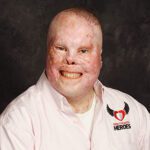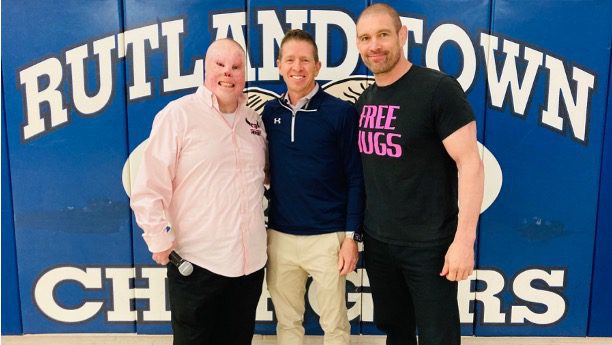By Emma Stanton, Staff Writer
War hero, Purple Heart recipient, father, friend, and public speaker, Army Sgt. Rick Yarosh has dedicated himself to spreading the unwavering message of H.O.P.E. — Hold On, Possibilities Exist. Yarosh visited Rutland last week to share his story and to inspire the next generation to push beyond hopelessness and to fight to live a life filled with beauty and love, and he will be speaking at Woodstock Union Middle/High School, Woodstock Elementary, and Prosper Valley School in April.
Yarosh has led a life that few can fully understand. A wrestler and football player out of Vestal, N.Y., Yarosh did not know exactly where his life would take him. Not keen on school, disinterested in attending college, Yarosh said he joined the army to find the purpose and responsibility he craved.
“I joined in 2004 — three years after 9/11 happened, but at that point, the attacks were still fresh in our minds,” Yarosh told the Standard this week. “I was proud to see how our country handled that crisis — as people, as citizens coming together. I wanted to be a part of that unity; I wanted to fight to protect that unity.”
Yarosh said there was a specific moment that inspired him to enlist. “What pushed me over the edge was on Easter morning, 2004, I woke to a headline in the local paper — ‘Sidney Grad Killed in Iraq.’ The picture staring back at me was a young man I knew from wrestling; he lived three towns over. I said to myself, ‘What am I doing?’ and Monday morning I went down to the recruiter’s office, signed the papers, and started basic training that June.”
Joining the army in 2004, Yarosh understood that he was to be deployed to an active warzone. “We were fighting two wars at the time. It was not a matter of if I was going to be deployed, but where would I be sent.”

Yarosh ended up in Iraq. “I was a cavalry scout; I had gone through all my training. I knew where I was heading, but nothing could have prepared me for what lay ahead. You don’t really know what a war is until you’re in it, and suddenly every aspect of your existence is changed. You walk along the street in Abu Ghraib, you pass a burning tire, and you run. In America, a burning tire on the side of the road may symbolize an accident; in Iraq, it was a trap — a sign for the enemy to attack. Same with something as simple as a bag of fast food lying on a dirt road. In the U.S., that’s just littering. In Iraq, it means an IED can hit at any moment.”
And it did. On Sept. 1, 2006, Yarosh’s squad was attacked by an IED in Abu Ghraib. He suffered severe burns that tore his body apart. For half a year following the attack, Yarosh recovered in the Brooke Army Medical Center in San Antonio, Texas, fighting through second- and third-degree burns on more than 60% of his body. His right leg had to be amputated below the knee. He lost his nose, both his ears, multiple fingers, and the function of both his hands. He emerged from that war zone a different man.
“There were times in recovery when I didn’t want to leave that hospital, when I didn’t know if I could continue on. I didn’t know what my life would look like after this injury. Physically, I had become extremely limited. I could never be a soldier again. I couldn’t even move my fingers; I had a prosthetic leg; the burns tore my skin apart; I could no longer handle heat the way I did in my youth. I fell into a state of despair and hopelessness. I needed a new purpose.”
Purpose found Yarosh at three in the morning in that San Antonio hospital, as he fought restless muscle syndrome, and the pain and discomfort that washed over him night after night. “I couldn’t sleep, my body was so uncomfortable, my muscles would not settle. And so, I watched TV — always the same station since I didn’t have function in my hands to change the channel. One night, Dave Roever, a Vietnam vet who also suffered horrific burns in the war, was on my little TV screen sharing his story. This man had all the things I wanted — a family, a job he loved, and a purpose he was sharing with others. He was a public speaker. And while that thought terrified me to my core, I realized that maybe I could follow in his footsteps.”

Sgt. Rick Yarosh, left, with colleagues Mark Alderman, center, and Tom Murphy. Yarosh and Murphy visited Rutland last week to speak with students and veterans about Yarosh’s experience in the army, his life story, and how he continues to find beauty and light in this world. Courtesy of Leon Thompson
Soon after this, Yarosh booked his first talk. “I was terrified. I wanted to cancel, but I knew I had made a commitment and I was going to see this through. I was still in the early days of my recovery, and so I rolled onto the stage in my wheelchair, notes on my sleeve because I still had no function in my hands. I have no idea what I said for those ten or fifteen minutes, and I apologized to the audience in that room because that talk was not for them; that day was for me.”
Yarosh continued, “That first public speech served as a way for me to realize what I should be doing with my life. At that point, it was something I needed to do. Talking about my experience helped me recover from it. Eventually, speaking about my life became something I loved doing. Public speaking went from something I hated, to something I needed, to then wanted, to then loved. I knew people would listen to what happened to me, I knew I would draw others in because of the way I looked. And I thought, ‘If I’m going to have the public’s attention, I might as well have something good to say.’ I think that’s really where the message of hope was born, in recognizing that I need to help people. I understood the issue of hopelessness because I existed with it so completely after my injury. I knew that it extended to everyone; that everyone needed to know hope was possible. I came to create, believe, and share the message of H.O.P.E. — Hold On, Possibility Exists.”
That phrase that Yarosh coined became an emblem that spread across the country, as Yarosh traveled from state to state, speaking about his experience to children and students of all ages.
“This is where my service dog, Amos, comes in. I avoided speaking to little kids early on. It was just too much; I didn’t want to damage the children. That’s how it felt — I would go in and they would be afraid, and then they would go home, and they would still be afraid. So, I avoided speaking at elementary schools for a long time. It wasn’t anyone else’s problem but my own. Amos got me to the point where I could speak to kids.”
The black Labrador became a bridge for Yarosh to reach students of every age. “We would go into classrooms with young children, and they would be taken aback by me, but Amos would come in, and they would forget that I existed for a bit. He was like the ultimate icebreaker, making everyone feel at ease. By the end of visiting kindergarten and first-grade students, kids would come up and ask us to attend their birthday parties. There was just an ease and a comfort Amos brought.”
In honor of his late dog’s memory, Yarosh wrote a book entitled “A Bridge Named Amos,” a story which he now shares with the many schools he visits. “My job is to make the kids I visit feel comfortable and to grow a connection with them. I am able to do that now, on my own, because of Amos.”
As a man who experienced more hardship than most, hope can be a difficult concept to embody. While today Yarosh is a person filled with light and love and humor and compassion, he, like many, suffered from moments of utter darkness. “There are two ways you can look at it,” Yarosh said. “You deal with crap for a long time and eventually grow so tired of existing in the midst of negativity. No psychologist, no psychiatrist, no doctor, no nurse — no one can change that for you. They can be there for you, but you must be the one to change your life. Today, I look around me and see this beautiful, amazing life. So many of these blessings have been with me all along, just hidden behind clouds of gray, covered in shadow. Difficult things are going to happen, but we are also okay; we are going to be okay, and we are going to rise above hardship.”
When asked how to look beyond the clouds of gray that can blind so many people to the joys of life, Yarosh said, “Open your eyes wider. Do not seclude yourself, do not surrender to the surface cover of darkness. Do not walk through life without noticing the good. The world is filled with beauty, but it is a choice to see it as beautiful. Open your eyes wider, and let the light flood in.”